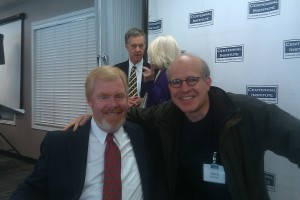Factcheck.org should have clarified that Romney would agree with Gingrich ad alleging Romney expanded access to “abortion”
Thursday, January 12th, 2012If you’ve ever tried to “fact check” a political ad, you know it’s a lot harder than it looks. What do the ads’ sparse words mean? What do the candidate’s vague positions include? At what point is an ad untrue, or three quarters of the way to the right on the pants-on-fire meter?
But to you journalists out there who are trying to fact check ads having anything to do with Mitt Romney and abortion, get ready for your head to explode.
Take for example Newt Gingrich’s ad attacking Romney for allegedly expanding access to abortion.
Respected journalists Lori Robertson and Robert Farley at Factcheck.org concluded that it was “highly misleading” for Gingrich’s ad to state that Romney “expanded access to abortion pills.”
The “abortion pills” in question are what most people would call “contraception.” Known as “Plan B” or morning-after pills, they are high-dose birth-control pills that can prevent a fertilized egg (or zygote) from thriving in the uterus. In 2005, Romney allowed expanded access to Plan B in Massachusetts.
Factcheck.org reported that because “abortion” was not actually involved, but instead “contraception” pills, then Romney cannot be credibly accused of expanding access to abortion.
I personally would agree with Factcheck.org, and its conclusion is in keeping with current law, but Romney himself would not agree.
Romney, like Gingrich, has stated that life begins at conception, and Romney told Mike Huckabee just this year that he’d “absolutely” favor a personhood amendment in Massachusetts’ constitution defining life as beginning at conception.
So Romney himself would define Plan B as an “abortifacient,” which is the word that anti-abortion activists use to describe “contraception” and other things that cause “abortions.” And he’s written as much.
Therefore, using Romney’s own definition of abortion, he expanded access to abortion by giving the green light to morning-after pills. And to be consistent, Romney would have to call them “abortion pills.”
To be fair to Gingrich, Factcheck.org should have stated this as they panned the Gingrich ad. Gingrich and Romney should define “abortion” and “contraception” the same way, because they both believe life begins at conception.
But Factcheck.org did offer some key context:
To be sure, some abortion opponents have pushed for a so-called “personhood” law declaring that life begins at the moment a human egg is fertilized, which could make the “morning-after” pill illegal, and arguably an “abortion” pill. But an effort to pass such a law by ballot initiative was recently rejected by more than 55 percent of voters in Mississippi. And of course, it wasn’t the law in Massachusetts.
Our view is that the language in the ad misleads voters into thinking Romney expanded access to RU-486, which – there’s no debate about it – induces abortion.
Nationally, journalists have had a hard time sorting out Romney’s position on personhood, with some reporters incorrectly stating that Romney has no position on the issue.
But here in Colorado, possibly because he’s had plenty of time to ponder the issue during past election cycles with personhood amendments, Denver Post Editorial Page Editor Curtis Hubbard has correctly concluded that Romney has come out for personhood. (Romney has flipped his position of federal personhood, but he’s stated that he’s for it at the state level.)
Just this week, Hubbard re-stated his view on Jon Caldara’s Devil’s Advocate television show on Colorado Public Television, KBDI:
“Romney already came out for personhood at the state level,” Hubbard told Caldara. “So if Romney is the nominee, he’s going to be asked that same question [about personhood]. It’s going to be difficult.”
Difficult for Romney would be seeing the doctor in the Bennet TV ad saying Romney wants to outlaw birth control, which, by Romney’s and Gingrich’s definition of “abortion,” and given their support of “personhood,” would be deemed by fact checkers as absolutely true.


